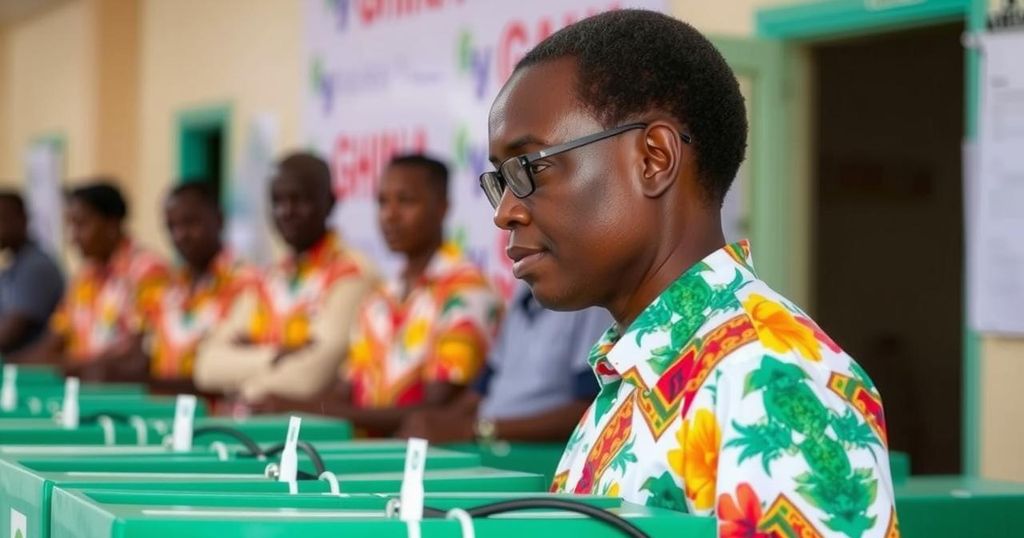Ghana Elections Amid Economic Turmoil: A Critical Democratic Test
Ghana’s elections open amidst severe economic crisis, with 18.7 million registered voters. Vice President Bawumia faces former President Mahama in a crucial electoral battle for the country’s future. Public discontent is high, with a majority believing the country is heading in the wrong direction. Major issues include rampant inflation, unemployment, and illegal gold mining as voters seek effective solutions to their pressing needs.
On Saturday, polls opened in Ghana for presidential and legislative elections amidst the dire backdrop of the country’s most severe economic crisis in decades. With approximately 18.7 million registered voters, the elections serve as a critical test of democracy in a region fraught with instability due to extremist violence and military coups. Although the election boasts 12 presidential candidates, the contest essentially boils down to a rivalry between Vice President Mahamudu Bawumia of the ruling New Patriotic Party (NPP) and former President John Dramani Mahama of the opposition National Democratic Congress (NDC), each offering limited hope for significant change.
Traditionally celebrated for its democratic practices, Ghana’s recent struggles include rampant inflation and significant job shortages. A recent survey indicated that 82% of Ghanaians believe the nation is on the wrong path, highlighting the widespread discontent. The NPP, which has not succeeded in alleviating the economic turmoil, faces renewed competition from the NDC, which campaigns on a platform of social democracy despite the similarities in their candidates’ programs.
In total, 276 parliamentary members will be elected concurrently. Both major parties currently hold 137 seats in a legislature comprised of 275 members, plus one independent. At the final campaign rallies, both candidates underscored their visions for economic recovery. Bawumia promised continuity and stabilization of the economy, while Mahama called for an urgent ‘reset’ across various sectors including governance and health.
The atmosphere in Accra leading up to the elections was characterized by enthusiasm, despite the underlying economic malaise. Ghana is still recovering from defaulting on foreign debt, which led to skyrocketing prices for essential goods. The inflation rate reached a staggering 54% last year, presenting a harsh reality for many citizens. Additionally, the illegal gold mining sector remains an important issue in the election, reflecting the desperate measures citizens have resorted to amid economic hardship. Despite government efforts to combat this, illegal mining continues to pose serious environmental and social challenges.
Thus, as Ghanaians head to the polls, they confront not only the immediate question of political leadership but also the pressing economic circumstances that impact their daily lives.
Ghana was once regarded as a model of stability and democratic governance in West Africa, having enjoyed a series of peaceful elections since the reintroduction of multiparty politics in 1992. However, the country is now grappling with a profound economic crisis characterized by steep inflation and high unemployment rates. These economic difficulties have significantly affected public sentiment, as evidenced by opinion polls suggesting a majority of the population feels the nation’s trajectory is in decline. The upcoming elections present an opportunity for Ghanaians to express their discontent and choose leaders who they hope might initiate meaningful change amidst this dire economic landscape.
In summary, Ghana’s recent elections occur against a backdrop of severe economic challenges that pose significant implications for the country’s political future. With voters largely dissatisfied with the current economic conditions, the elections serve as an opportunity for change. However, the limited differentiation between the main candidates raises questions about the potential for substantive improvement in governance and economic prospects. Ultimately, the outcome will indicate not only the direction of political leadership but also the public’s priorities in light of ongoing economic hardships.
Original Source: www.newsday.com




Post Comment